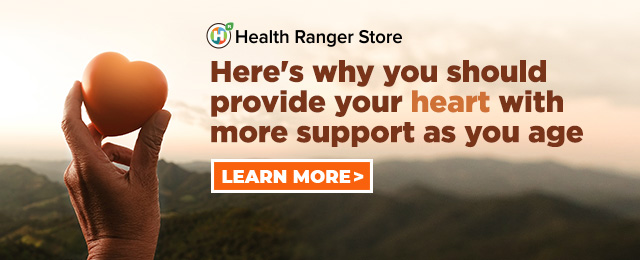CDC calls insufficient sleep a public health epidemic: Learn to sleep like a baby
Monday, July 28, 2014 by: Mike Bundrant
Tags: sleep deficiency, brain health, busy minds

- TAKE IT DOWN Act advances in Congress amid free speech concerns
- Gardening tips: 15 Simple tricks to double your garden’s yield this season
- Survival 101: Dangerous places to avoid when disaster strikes
- Hospital staffers sound alarm after 10 nurses were diagnosed with BRAIN TUMORS
- Nature’s arsenal: How plant compounds power military survival and healthcare in crisis
- Kawasaki unveils rideable ROBOT HORSE powered by hydrogen
- Criminal referral requests filed against Fauci and top COVID officials in seven states
- DOJ and ATF kill Biden’s “Zero Tolerance” firearms dealer policy
- Widespread social and economic unrest: Steve Quayle issues urgent financial warning of imminent asset collapse in new interview with Mike Adams
- “Prepare Tribe: Prepare, Protect, Provide” on BrightU: How to build a disaster-proof shelter in the middle of nowhere
- New studies ignite debate: Fluoride linked to autism and ADHD, prompting calls for policy reassessment
- Amazon's Kuiper satellite launch delay highlights uphill battle against Musk's Starlink
- Israeli lobbyists boast of controlling US national security policy in leaked AIPAC audio
- Barley: A nutrient-dense ancient grain with modern benefits
- Analysis: The coming economic collapse, a mass uprising and Trump's three secret weapons to halt the growing revolt
- Aerosolized bioweapons? Strange “diploid biomasses” falling out of the sky in Florida captured under the microscope
- Sovereign debt paradox: U.S.-China mutual holdings fuel geopolitical tensions
- Federal appeals court authorizes DOGE access to Education, Treasury and OPM records
- Tulsi Gabbard leads charge against the Biden regime’s global censorship of the 'Disinformation Dozen'
- Fauci is back in the limelight, and he’s busy promoting a future COVID or FLU pandemic
- Aerosolized bioweapons? Strange “diploid biomasses” falling out of the sky in Florida captured under the microscope
- Analysis: The coming economic collapse, a mass uprising and Trump's three secret weapons to halt the growing revolt
- Widespread social and economic unrest: Steve Quayle issues urgent financial warning of imminent asset collapse in new interview with Mike Adams
- Kiss Your Genetic Privacy Good-Bye! 23andMe Gets Green Light to Sell Your Intimate Genetic Details to Anyone They Want
- Tulsi Gabbard takes aim at censorship: Justice for the ‘Disinformation Dozen’
- Mike Adams releases country western hit single: Goin’ Back in Time is Comin’ Home
- U.S. lawmakers investigate Meta over alleged China collaboration
- CLOT SHOT PLANDEMIC UNFOLDING: Fibrous, rubbery clots caused by covid injections have prion-like seeding activity
- Chemtrails unveiled: How the CIA and Big Business are manipulating the weather for profit
- How Israeli military-connected corporations are secretly controlling your online privacy
- European Court of Justice: Healthcare professionals who promoted or administered COVID-19 vaccines are CRIMINALLY LIABLE for any harm caused
- DEATH by VACCINE or face PRISON time: Canadian Freedom Convoy leaders CONVICTED for protesting forced vaccination during the Covid Plandemic
- Defunding DEADLY mRNA jabs: Government funding for mRNA technology being scrutinized and sidelined until proven "safe and effective" for real
- Federal employees whine over DOGE's new directive requiring them to do a 5-point summary of weekly accomplishments
- U.S. approves new Russian ambassador as diplomatic thaw continues
- Curcumin’s ancient healing power supercharges muscle recovery, and its effects are compounded with anti-inflammatory foods and supplements
- Newly released JFK files reveal Pentagon's role in creating Lyme disease and covid in the same lab
- Analysis: The coming economic collapse, a mass uprising and Trump's three secret weapons to halt the growing revolt
- Mike Adams releases country western hit single: Goin’ Back in Time is Comin’ Home
- Aerosolized bioweapons? Strange “diploid biomasses” falling out of the sky in Florida captured under the microscope
- Kiss Your Genetic Privacy Good-Bye! 23andMe Gets Green Light to Sell Your Intimate Genetic Details to Anyone They Want
- Dr. Mike Yeadon releases 15-minute testimony - WATCH - about genocidal intent of COVID “vaccines”
- Trump reverses course on Gaza plan, says “nobody is expelling Palestinians”
- MEDICAL BOMBSHELL: FDA admits Covid mRNA 'Vaccines' CAUSE CANCER
- European Court of Justice: Healthcare professionals who promoted or administered COVID-19 vaccines are CRIMINALLY LIABLE for any harm caused
- The Health Ranger releases “Vaccine Zombie” song and music video, using AI-animated zombies for the music video
- 5 Simple steps to boost your brainpower: How to strengthen executive function in a distracted world
- A lack of integrity in Academia: Harvard professor found GUILTY of fraudulent research to promote CRT theory
- Federal employees whine over DOGE's new directive requiring them to do a 5-point summary of weekly accomplishments
- EPA advisor admits the agency is funneling billions to climate groups ahead of Trump’s return to White House
- California's social media censorship law struck down: A victory for free speech or a threat to online safety?
- Space war brewing? Russia threatens to destroy Starlink satellites
- Survival 101: Effective EMF blocking techniques
- Rep. Nancy Mace introduces bill to ban biological males from female facilities on federal property
- Red Cross issues warning to stop blood plasma donations from vaccinated people
- Scientists confirm: GENIUS brain function can be spontaneously unleashed in humans without any apparent cause
- EPA advisor admits the agency is funneling billions to climate groups ahead of Trump’s return to White House
- HYSSOP: What research reveals about the health benefits of this ancient holy herb
- Two containers with completed ballots fall out of truck in Florida
- Newly released JFK files reveal Pentagon's role in creating Lyme disease and covid in the same lab
- Global leaders unite to clamp down on “misinformation” with UN-backed Cascais Declaration
- BREAKING: 2025 NDAA authorizes mandatory military draft of WOMEN across America… as Pentagon pursues global NUCLEAR war with both Russia and China at the same time
- Michael Yon warns of a ZIONIST TAKEOVER in Trump’s second administration
- Ozempic and Wegovy weight loss drugs are injectable LIZARD VENOM PEPTIDES that may unleash a devastating wave of organ failure… side effects align with symptoms of SNAKE BITES
- The Health Ranger releases “Vaccine Zombie” song and music video, using AI-animated zombies for the music video
- Mike Adams releases country western hit single: Goin’ Back in Time is Comin’ Home
- BOMBSHELL: DNA testing kits are a SCAM to develop ethnic-specific bioweapons
- Israeli soldiers accused of even more torture and abuse in the West Bank
- These 13 countries just signed an agreement to engineer a global FAMINE by destroying food supply
- NASA admits that climate change occurs because of changes in Earth’s solar orbit, and NOT because of SUVs and fossil fuels
- Fully vaccinated about to see “tsunami” of illness and death, warns virologist
- RFK Jr. clears key hurdle: Sen. Susan Collins backs controversial HHS nominee, signaling a new era for health policy
Lack of sleep has been linked to a number of public issues such as industrial disasters, medical and occupational errors, and motor vehicle accidents.
In addition to these well-known consequences, however, new studies have shown that people who receive insufficient sleep are at increased risk for chronic disease such as diabetes, hypertension, obesity, and even cancer.
Research backs the call for better sleep with shocking statistics
Two recent studies have shown that unhealthy sleep behaviors and self-reported sleep difficulties are becoming more prevalent across the country, and insufficient sleep is becoming of increasing concern.According to the Behavioral Risk Factor Surveillance System Survey, 35% of the nearly 75,000 adults who responded received less than seven hours per night. A number of other health problems were also reported, including 38% of respondents reporting that they fell asleep unintentionally during the day at least once during the preceding month.
An alarming 4.7 percent nodded off while driving. This is especially concerning when you consider that drowsy driving accounts for at least 1550 fatalities and 40,000 traffic accident injuries each year.
According to the National Health and Nutrition Examination Survey Sleep Disorders Questionnaire, adults between the ages of 40-59 are most likely to get less than eight hours of sleep at 40.3 percent, with the ages of 20-39 not far behind at 37 percent.
Furthermore, those adults who did report getting less than seven hours of sleep per night also experienced more difficulties with performing daily tasks.
How much sleep is necessary?
According to the National Institutes of Health, school-age children need a minimum of 10 hours of sleep per day, while teenagers need around nine hours. Adults need at least seven hours. Unfortunately, the National Health Interview Survey finds that nearly 30 percent of adults get less than six hours of sleep per night on average. Only 31 percent of high school students receive eight hours of sleep on an average school night.There are a number of ways for both adults and children to improve their sleep habits, known as sleep hygiene. First, try to go to bed at the same time each day. Likewise, set an alarm to ensure you rise at the same time every morning. Avoiding caffeine and alcohol before bed can both make falling asleep easier and improve the quality of your sleep, as will avoiding nicotine. While a small bedtime snack is okay, it's best to avoid eating a large meal.
For many with busy minds, sleep hygiene falls short
Indeed, practicing good sleep hygiene does NOT mean that your busy head calms down when you hop into bed. If you really want to sleep like a baby, then you've got to find a way to turn off all the inner commotion.What causes the mental commotion that you can't just turn off? Fascinating research as reported in the March 2010 issue of Scientific American Magazine suggests that the brain's Default Mode Network (DMN) is the culprit. Scientific American positioned the DMN as the brain's dark energy.
The DMN is responsible for self-referential thoughts (autopilot thinking). When the DMN is overactive, your mind churns and spins, generating thoughts that keep you tense and awake.
Most people have never heard of the DMN, much less how to turn it off. You can, in fact, turn off your DMN, clear your head and relax. This has been proven via fMRI scans. It's relatively easy to do and it leads to natural sleep when you are tired.
The iNLP Center's Sleep Switch program has been helping thousands to turn off their busy head and get to sleep quickly. Click here to learn more.
If you like this article, then like my Facebook Page to keep up with all my writing.
About the author:
Watch the free video The AHA! Process: An End to Self-Sabotage and discover the lost keys to personal transformation and emotional well-being that have been suppressed by mainstream mental health for decades.
The information in this video has been called the missing link in mental health and personal development. In a world full of shallow, quick-fix techniques, second rate psychology and pharmaceutical takeovers, real solutions have become nearly impossible to find. Click here to watch the presentation that will turn your world upside down.
Mike Bundrant is co-founder of the iNLP Center and host of Mental Health Exposed, a Natural News Radio program.
Follow Mike on Facebook for daily personal development tips.
Sleep deficiency at FETCH.news
Get independent news alerts on natural cures, food lab tests, cannabis medicine, science, robotics, drones, privacy and more.
Take Action: Support Natural News by linking to this article from your website
Permalink to this article:
Embed article link: (copy HTML code below):
Reprinting this article:
Non-commercial use OK, cite NaturalNews.com with clickable link.
Follow Natural News on Facebook, Twitter, Google Plus, and Pinterest
Science News & Studies
Medicine News and Information
Food News & Studies
Health News & Studies
Herbs News & Information
Pollution News & Studies
Cancer News & Studies
Climate News & Studies
Survival News & Information
Gear News & Information
News covering technology, stocks, hackers, and more



"Big Tech and mainstream media are constantly trying to silence the independent voices that dare to bring you the truth about toxic food ingredients, dangerous medications and the failed, fraudulent science of the profit-driven medical establishment.
Email is one of the best ways to make sure you stay informed, without the censorship of the tech giants (Google, Apple, Facebook, Twitter, YouTube, etc.). Stay informed and you'll even likely learn information that may help save your own life."
–The Health Ranger, Mike Adams













































